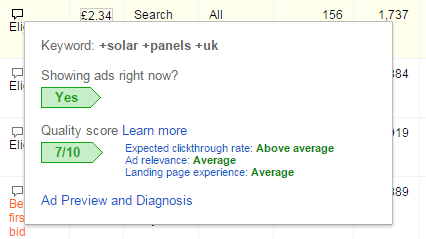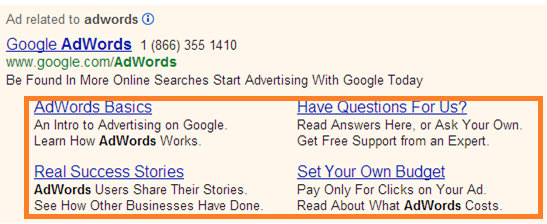If you are looking to improve your Quality Scores in Google Ads (formerly known as Google AdWords), almost every single PPC expert will start by telling you to take steps to improve your click-through rate. No surprise there. Google has not been shy in sharing that CTR is the most influential metric used in calculating your Quality Score, and our own internal studies back this up.
The only question is, how influential?
I have heard speculations as high as 60%. However, if that were true, it would not explain why you see keywords with a great CTR and only a mediocre Quality Score. Of course, the real answer is much more complicated.
Take a look at this graph showing the relationship between click-through rate and Quality Score for ads in the top position:
If you look at a plot between CTRs and their respective Quality Scores, you will see the relationship between the two takes on a logarithmic trend rather than a linear one. This means that as click-through rate increases, it has less and less of an impact on your Quality Score. In economics, we call this the law of diminishing returns.
Let’s look at a mathematical example. Say your actual search network CTR is 2% with an average QS of around 4, but your expected CTR is 4%. You make changes in your account to bring your CTR up two percentage points to meet the average. Following the trend line, you can expect your keyword QS to jump 1.5 points to an average of 5.5.
But you want to be above average! Now you work to improve your CTR up another two percentage points to 6%. This time your QS only jumps 0.7 points to about 6.2. In fact, to see the same return on Quality Score, you will need to double the expected CTR from 4% to 8%. You’d need to quadruple the expected CTR to get to an average QS of 8.
So summarize, if your actual search network CTR is below expected, making changes to improve it can significantly increase your Quality Score. However, once you have achieved an expected click-through rate, you can make HUGE improvements to your click-through rate and only see minimal improvement in QS.
[Pro tip: You can check how your individual keywords compare to their expected CTRs in Google Ads by hovering over the speech bubble next to a particular keyword on the campaigns page. Google offers a prediction of below average, average, and above average.]
Feeling defeated? DON’T! Your still have options when it comes to improving account performance:
Give it Some Time.
Quality Score doesn’t change overnight. Google looks at your account history when making Quality Score calculations, so a few weeks of improved CTR isn’t going to wash away months and months of poor performance. I would never recommend letting your account run on autopilot, but if you make it a priority to actively monitor your account (as you should), remember that it’s going to take some time for these metrics to reflect all your hard work. Don’t write off your Quality Score hopes and dreams too early.
Use Ad Extensions.
If you aren’t using them already, ad extensions are a double whammy when it comes to improving your QS. Google now includes the presence of ad extensions when calculating your Quality Scores. If that weren’t incentive enough, they also increase your click-through rate by occupying more space on the SERP, which in turn boosts your QS ever further!
Sitelinks, for example, are super simple to set up and give the searcher several pathways to get to your website.
Improve Your Landing Page Experience.
It can be too easy to forget about this component of your Quality Score. In fact, 25% of Google Ads advertisers send all of their PPC traffic to one single page. Be sure to have unique landing pages with content that is highly relevant to your campaigns. Landing page copy should include high-performing keywords in relation to your ad groups and ad text.
Revisit Your Goals.
People like to look at Quality Score because it is an indicator of several aspects of account performance, but chances are your goal isn’t to increase Quality Score just to prove that you can manage Google Ads better than everyone else. Take a step back and analyze why QS is so important to you in the first place. Are you trying to make the most of a limited budget? Do you want your ads showing at the top of the page? Take a look at other metrics that directly correlate to your goals and optimize from there.
Just remember PPC is a marathon, not a sprint. Quality Score is a direct reflection of that; making improvements to CTR is a great place to start but it won’t get you to the finish line on its own. Try to avoid Quality Score tunnel vision by looking for other measurable ways to define success for your search campaigns!





0 Comments